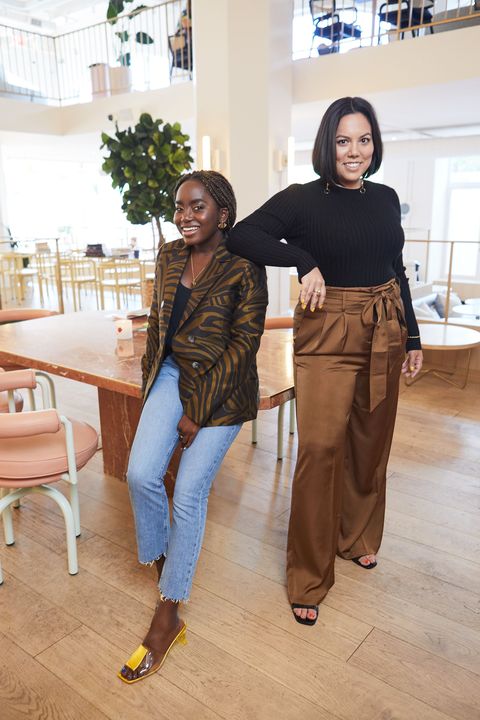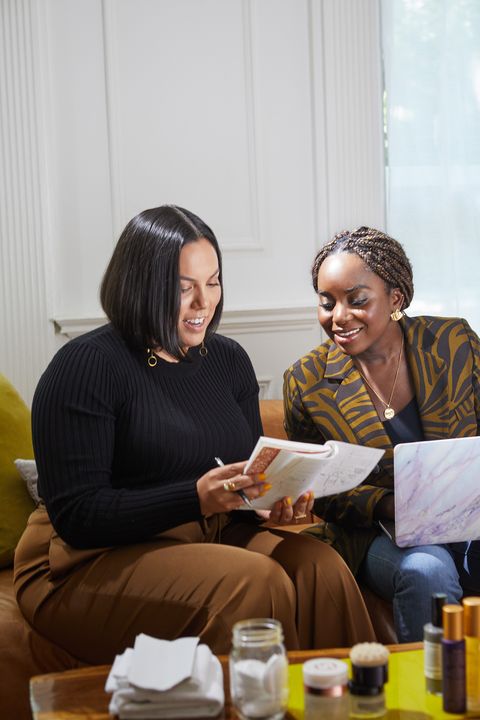Mandi Nyambi and Lanya Olmsted are out to reimagine what a skincare company looks like. The longtime friends and entrepreneurs are the founders of Baalm, a platform for the skincare-obsessed to discover and understand the ingredients, products, and routines that are right for them.
With their complementary skill-sets—Nyambi is a scientist with degrees in stem cell biology and nutrition, while Olmsted’s background is in UX design and marketing—they're working to build a community that brings transparency, connection, and calm to a world that's overwhelmed with products and trends.
When they met with Natalia Oberti Noguera, founder and CEO of Pipeline Angels, they were in the throes of a branding overhaul—including, crucially, coming up with a new name for the business (until recently, it was Le CultureClub). Here’s what they learned about how to shift gears while staying true to their vision.
1. Your brand name is more than just a label
Olmsted: “We used to name very descriptively, as in,‘This is what we are.’ But what Natalia helped us realize was that our brand name can also be focused on evoking an emotion or a feeling. And we had to think about, ‘What is that feeling in our company?’ We were doing all of these brainstorming sessions and ultimately it came down to calmness.
“We were riffing and came up with the word ‘balm,’ and we were like: That’s so amazing, because there are skincare balms, and when you say it—honestly, I relax. It also helped us figure out: Okay, this is who we are at our core and now our name can reflect that.”
Nyambi: “I think it’s allowed us to really expand who we are as a brand. We have a really different way of thinking about our events now. We want to continue to make them feel like they’re our respite. In the past, we’d done panel-style events, which were either very business-focused or trend-focused, and now we have an entire series of events that are literally just meant to calm you down after work with some skincare tied in. And that changes the way that we interact with our community.”
2. Don’t undersell yourself early on
Nyambi: “There’s one service that we’ve been evaluating for the 2019/2020 calendar for our business, and I told Natalia, ‘Ok, here’s what my strategy is for testing out this service. I want to try it in a small way that would be free at first. What do you think about it?’ And her response was, ‘You can charge for that from the beginning. You're already bringing value, and if you don’t charge from the beginning, why would that business then agree to pay you for it afterwards?’
“It helped us understand, ‘If we can charge for that, we can probably charge for something else we’re working on.’ And that changes the way that we make a lot of decisions—that changes our financial models. It has a big impact on our business.”
3. Remain open to feedback (even if you don’t initially agree)
Nyambi: “We’re opinionated and when we make decisions, we have a lot of reasons to back it up. So to change our minds, I admit, it doesn’t happen like that. We really need to be convinced, we need to understand the problem, and we need to understand a different approach.
“For a long time we disagreed [with Natalia] on the approach for re-naming the company. We were like, ‘This is why we have to name it this way.’ And she was like, ‘Here's another example, and here's another example, and here’s another example.’ Maybe we were a little hard-headed, but we kept engaging in that conversation.
“That was also a learning journey for us. Because in those disagreements, we’re understanding what our motivations are, what our thinking is, the assumptions we have made, and we understand what hers are, and it brings a whole new way of thinking.”
Worn throughout: Mandi- 3.1 Phillip Lim blazer, Everlane cami and jeans, miista shoes, Leigh Miller necklace, Lanya - ASOS top and shoes, Universal Standard pants



Comments
Post a Comment